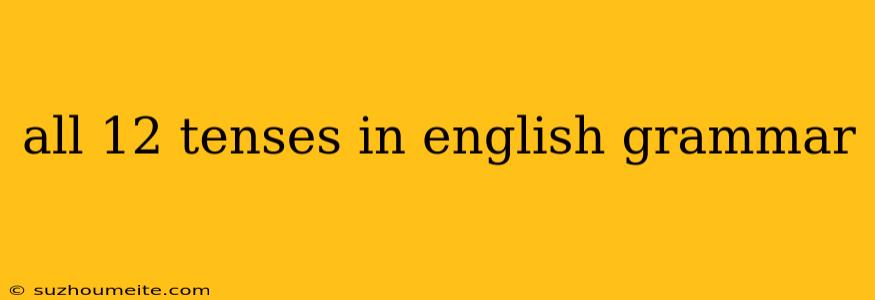All 12 Tenses in English Grammar
English grammar can be a bit overwhelming, especially when it comes to tenses. But don't worry, it's not as complicated as it seems!
The English language has 12 tenses, which are divided into three categories:
- Simple Tenses: Present Simple, Past Simple, Future Simple
- Continuous Tenses: Present Continuous, Past Continuous, Future Continuous
- Perfect Tenses: Present Perfect, Past Perfect, Future Perfect
- Perfect Continuous Tenses: Present Perfect Continuous, Past Perfect Continuous, Future Perfect Continuous
Let's explore each of these tenses in detail:
Simple Tenses
1. Present Simple:
- Use: Describes actions that happen regularly, facts, and routines.
- Form: Base form of the verb (except for third person singular, which uses -s/-es).
- Example: I play tennis every Saturday. The sun rises in the east.
2. Past Simple:
- Use: Describes actions that happened in the past and are completed.
- Form: Usually the base form + -ed or irregular past tense form.
- Example: I played tennis yesterday. She went to the store.
3. Future Simple:
- Use: Describes actions that will happen in the future.
- Form: Will + base form of the verb.
- Example: I will play tennis tomorrow. She will go to the beach next week.
Continuous Tenses
4. Present Continuous:
- Use: Describes actions happening now, in progress.
- Form: Am/is/are + verb + -ing.
- Example: I am playing tennis right now. The sun is shining brightly.
5. Past Continuous:
- Use: Describes actions that were happening at a specific time in the past.
- Form: Was/were + verb + -ing.
- Example: I was playing tennis when you called. The sun was shining yesterday.
6. Future Continuous:
- Use: Describes actions that will be happening at a specific time in the future.
- Form: Will be + verb + -ing.
- Example: I will be playing tennis tomorrow at 3 pm. The sun will be shining all day next week.
Perfect Tenses
7. Present Perfect:
- Use: Describes actions that started in the past and continue up to the present, or actions completed in the past with a connection to the present.
- Form: Have/has + past participle.
- Example: I have played tennis for many years. She has gone to the store.
8. Past Perfect:
- Use: Describes actions that were completed before a specific point in the past.
- Form: Had + past participle.
- Example: I had played tennis before I went to college. She had gone to the store before I called.
9. Future Perfect:
- Use: Describes actions that will be completed by a specific time in the future.
- Form: Will have + past participle.
- Example: I will have played tennis for 10 years by next year. She will have gone to the store by the time we get there.
Perfect Continuous Tenses
10. Present Perfect Continuous:
- Use: Describes actions that started in the past and are still happening now, often emphasizing the duration of the action.
- Form: Have/has been + verb + -ing.
- Example: I have been playing tennis since I was a child. She has been going to the store every week.
11. Past Perfect Continuous:
- Use: Describes actions that were happening before another action in the past.
- Form: Had been + verb + -ing.
- Example: I had been playing tennis for an hour before I got tired. She had been going to the store for years before she moved.
12. Future Perfect Continuous:
- Use: Describes actions that will be happening for a certain duration by a specific time in the future.
- Form: Will have been + verb + -ing.
- Example: I will have been playing tennis for 2 hours by the time you arrive. She will have been going to the store for 10 years by next year.
Understanding these 12 tenses will give you the tools to express yourself more accurately and effectively in English. By practicing and applying them, you can master the art of using the right tense for the right occasion.
